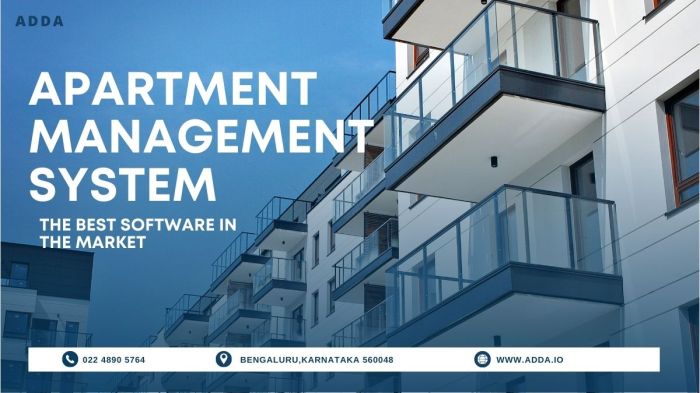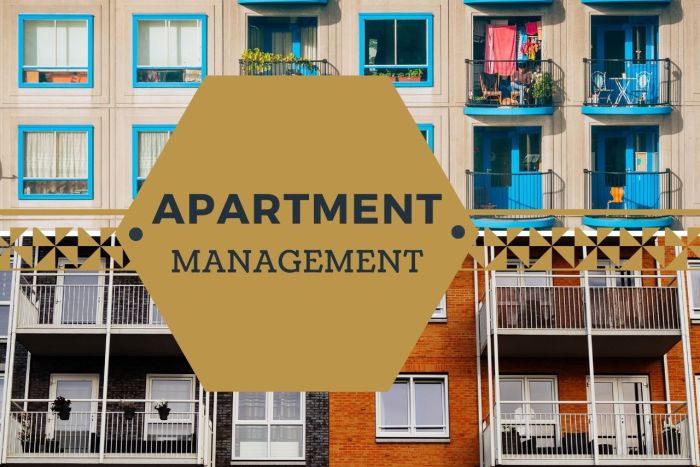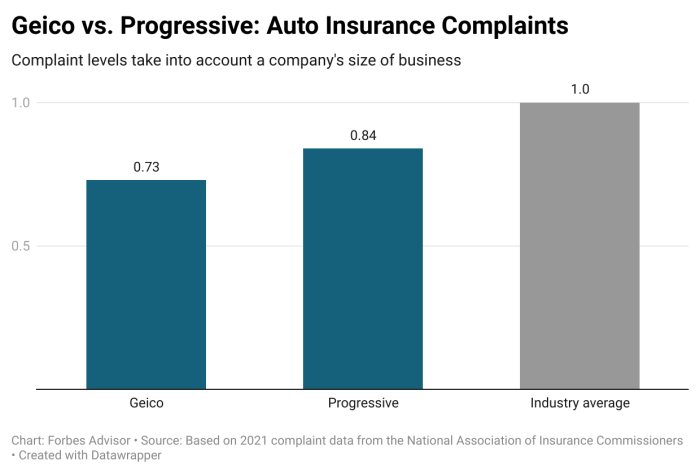Embark on a journey through the world of apartment property management, where the art of effective management can transform the value of properties. Dive into the realm of responsibilities, maintenance, tenant relations, financial management, and legal considerations that shape the landscape of apartment complexes.
Explore the nuances of daily tasks, tenant screening, financial aspects, and legal regulations that are crucial for a thriving apartment property management system.
Importance of Apartment Property Management
Effective property management for apartment complexes is crucial for maintaining the overall well-being and value of the property. Proper management ensures that the building is well-maintained, tenants are satisfied, and potential issues are addressed promptly.
Enhancing Property Value
Investing in professional property management services can significantly enhance the overall value of an apartment complex. By ensuring that the property is well-maintained, attractive, and up-to-date, property managers can increase rental rates, attract high-quality tenants, and ultimately maximize the property's value over time.
Benefits of Professional Property Management
- Expertise: Property managers bring a wealth of knowledge and experience to the table, ensuring that the property is managed efficiently and effectively.
- Tenant Satisfaction: Professional property management can lead to higher tenant satisfaction, lower turnover rates, and ultimately, a more stable income stream.
- Maintenance and Repairs: Property managers oversee routine maintenance and repairs, preventing small issues from escalating into costly problems down the line.
- Legal Compliance: Property managers stay up-to-date on all relevant laws and regulations, ensuring that the property is always in compliance and reducing the risk of legal issues.
Key Responsibilities of Apartment Property Managers
Apartment property managers play a crucial role in ensuring the smooth operation and maintenance of residential buildings. They are responsible for overseeing various aspects of property management to provide a safe and comfortable living environment for tenants.
Primary Duties and Responsibilities:
- Property Maintenance: Apartment property managers are in charge of scheduling and overseeing maintenance work, repairs, and renovations to ensure that the building is well-maintained and in good condition.
- Rent Collection: They are responsible for collecting rent from tenants, ensuring timely payments, and enforcing lease agreements.
- Tenant Screening and Leasing: Property managers are involved in screening potential tenants, conducting background checks, and preparing lease agreements.
- Financial Management: They handle budgeting, accounting, and financial planning for the property, including setting rental rates and managing expenses.
- Compliance with Laws and Regulations: Apartment property managers must ensure that the property complies with all local, state, and federal laws and regulations, including building codes and fair housing laws.
Examples of Daily Tasks:
- Responding to tenant inquiries and concerns
- Inspecting the property for maintenance issues
- Showing vacant units to prospective tenants
- Conducting regular property inspections
- Coordinating with maintenance staff and contractors
Role in Tenant Relations and Conflict Resolution:
Apartment property managers play a key role in maintaining positive relationships with tenants, addressing their concerns, and resolving conflicts that may arise. They act as a point of contact for tenants and work to ensure that their needs are met while upholding the rules and regulations of the property.
Maintenance and Repairs in Apartment Property Management
Regular maintenance and timely repairs are crucial aspects of apartment property management to ensure the safety, comfort, and satisfaction of tenants. Neglecting maintenance can lead to more significant issues down the line, costing more time and money to fix.
Handling Maintenance Requests from Tenants
Effective strategies for managing maintenance requests from tenants include establishing clear communication channels, providing easy-to-use online portals for submitting requests, promptly addressing and resolving issues, and conducting regular inspections to prevent potential problems.
- Establish a streamlined process for tenants to submit maintenance requests, ensuring they are promptly received and assigned to the appropriate personnel.
- Implement a tracking system to monitor the status of each maintenance request and ensure timely completion.
- Prioritize urgent requests that impact the health and safety of tenants, such as plumbing issues or electrical problems.
- Communicate with tenants throughout the maintenance process to keep them informed of progress and expected timelines for completion.
Maintaining Common Areas and Amenities
Maintaining common areas and amenities in apartment buildings is essential for creating a positive living environment and enhancing the overall appeal of the property.
- Develop a regular maintenance schedule for cleaning and upkeep of common areas, such as lobbies, hallways, and recreational facilities.
- Inspect and maintain amenities like swimming pools, fitness centers, and outdoor spaces to ensure they are safe and well-maintained for tenant use.
- Address any issues or damages to common areas promptly to prevent further deterioration and maintain the property's value.
- Engage with tenants to gather feedback on the condition of common areas and amenities, making improvements based on their suggestions and preferences.
Tenant Screening and Lease Management
When it comes to apartment property management, tenant screening and lease management are crucial aspects that can greatly impact the overall success of the property. By carefully selecting tenants and effectively managing leases, property managers can ensure a positive experience for both tenants and property owners.
Tenant Screening Process
One of the first steps in tenant screening is to have potential tenants fill out a rental application. This application typically includes personal information, rental history, employment details, and references. Property managers can use this information to conduct thorough background checks and credit evaluations to assess the financial stability and rental history of each applicant.
Importance of Thorough Background Checks and Credit Evaluations
Conducting thorough background checks and credit evaluations is essential to ensure that potential tenants are trustworthy and capable of fulfilling their lease obligations. By verifying information provided in the rental application and assessing credit history, property managers can make informed decisions about potential tenants, reducing the risk of late payments, property damage, or lease violations.
Tips for Successful Lease Management
- Clearly Artikel lease terms and conditions: Make sure that lease agreements are detailed and clearly communicate the expectations of both parties.
- Regularly communicate with tenants: Establish open lines of communication with tenants to address any concerns, questions, or maintenance issues promptly.
- Enforce lease agreements consistently: Ensure that all tenants are held accountable for following lease terms and address any violations promptly.
- Renew leases in a timely manner: Plan ahead and initiate lease renewal discussions well before the lease expiration date to avoid any gaps in occupancy.
Financial Management in Apartment Property Management

Managing the financial aspects of apartment properties is crucial for ensuring the smooth operation and profitability of the complex.
Budgeting and Rent Collection
Effective budgeting is essential for planning expenses, maintenance, and upgrades within the apartment complex. It involves forecasting income, setting aside funds for repairs, utilities, and other operational costs to ensure the financial health of the property. Rent collection is a key aspect of financial management, ensuring that tenants pay their rent on time and in full to maintain a steady cash flow.
Setting Competitive Rental Rates and Handling Rent Increases
Setting competitive rental rates requires market research to determine the optimal price that attracts tenants while maximizing revenue. Handling rent increases involves understanding lease agreements, local regulations, and tenant communication to implement fair and justifiable adjustments in rent.
Tracking Expenses, Maximizing Revenue, and Financial Reporting
Tracking expenses involves keeping detailed records of all financial transactions, including maintenance costs, utilities, and property management fees. Maximizing revenue includes identifying opportunities for additional income, such as offering amenities or services to tenants. Financial reporting is essential for monitoring the financial performance of the apartment complex, providing insights into profitability and areas for improvement.
Legal Considerations in Apartment Property Management

When it comes to apartment property management, understanding and adhering to legal regulations is crucial for property managers. Failure to comply with these regulations can lead to legal disputes, fines, and damage to the property's reputation.
Key Legal Regulations and Requirements
- Property managers must comply with landlord-tenant laws that govern the rights and responsibilities of both parties.
- Adherence to fair housing regulations is essential to prevent discrimination against tenants based on race, color, religion, sex, familial status, national origin, or disability.
- Compliance with building codes and safety regulations is necessary to ensure the well-being of tenants and the property itself.
Mitigating Legal Risks and Handling Disputes
- Property managers can mitigate legal risks by staying informed about changes in laws and regulations, conducting regular property inspections, and keeping detailed records of all interactions with tenants.
- Handling legal disputes effectively involves addressing issues promptly, seeking legal advice when necessary, and maintaining open communication with tenants to prevent escalations.
- In cases of legal disputes, property managers can consider mediation or arbitration as alternative dispute resolution methods to avoid costly and time-consuming court proceedings.
Ending Remarks
In conclusion, apartment property management is a multifaceted domain that requires attention to detail, strategic planning, and a deep understanding of the market. By investing in professional services and implementing best practices, property managers can elevate the living experience for tenants and maximize the value of their investments.
FAQ Corner
What are the key responsibilities of apartment property managers?
Apartment property managers are tasked with overseeing daily operations, managing tenant relations, handling maintenance requests, and ensuring compliance with lease agreements.
How important is regular maintenance in apartment property management?
Regular maintenance is crucial for preserving the value of the property, ensuring tenant satisfaction, and minimizing repair costs in the long run.
What financial aspects are involved in managing apartment properties?
Financial aspects include budgeting, rent collection, setting competitive rental rates, tracking expenses, maximizing revenue, and financial reporting.









